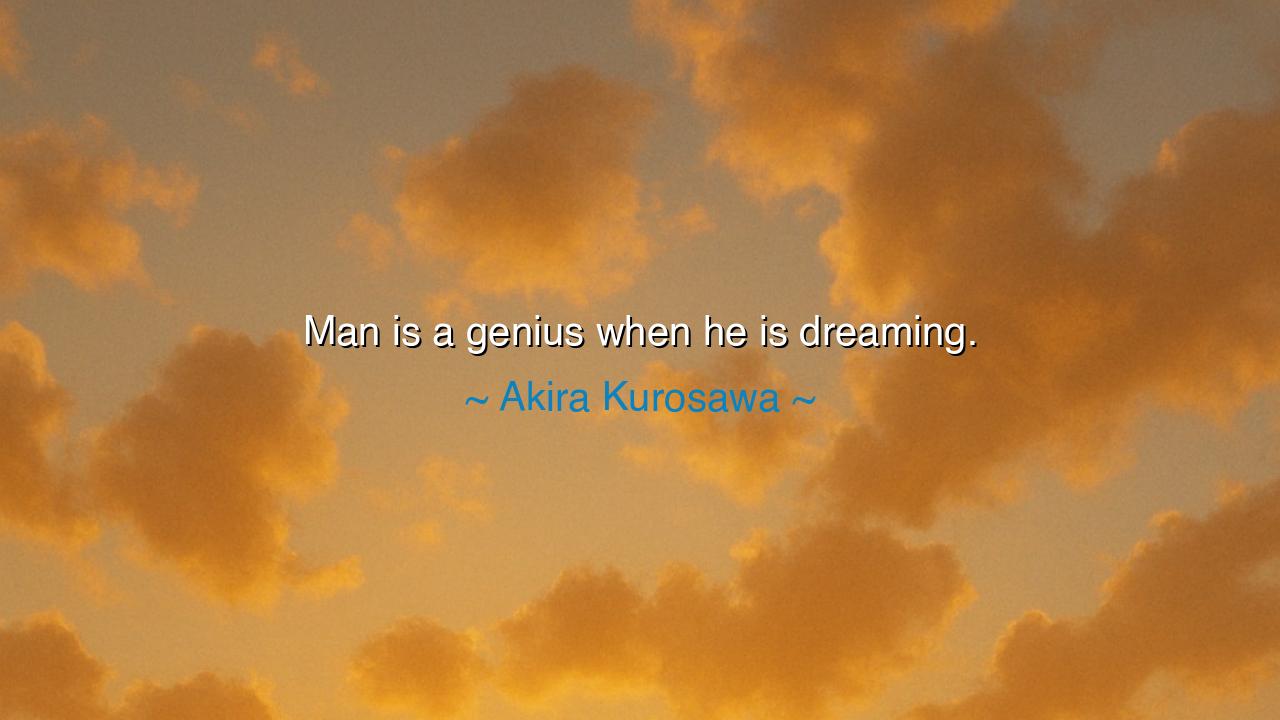
Man is a genius when he is dreaming.






“Man is a genius when he is dreaming.” — Thus spoke Akira Kurosawa, the great master of Japanese cinema, whose films breathed both the fire of myth and the quiet truth of the human heart. In this brief yet eternal line, Kurosawa reveals a secret that the ancients themselves might have whispered — that genius is not born of calculation, nor forced by intellect, but awakened in the realm of dreams. For when man dreams — whether in sleep or in the waking visions of imagination — he moves beyond the limits of reason and enters the boundless kingdom of creation.
To dream, in Kurosawa’s vision, is not to escape reality but to expand it. The waking world confines us with its rules, its duties, its fears. But in the dream, the soul remembers its true inheritance — the freedom to imagine, to shape, to become. The genius within man stirs when his mind is no longer bound by doubt or logic, when he dares to see not what is, but what could be. Kurosawa himself lived by this creed. His films — Dreams, Rashomon, Seven Samurai — are not mere stories, but windows into the deep dreaming of humanity: where spirit meets art, and where imagination redeems the ordinary.
When Kurosawa said these words, he spoke from the heart of the artist’s struggle. He knew that reason builds the world, but dreams give it soul. The scientist may measure the stars, but the dreamer names them. The engineer may craft the bridge, but the dreamer first envisions its crossing. All human greatness — every poem, every invention, every revolution — begins in the quiet of the dream. For in that sacred space, man communes with the infinite, and the veil between the possible and impossible is lifted.
Consider Leonardo da Vinci, the eternal embodiment of Kurosawa’s words. In his notebooks, filled with sketches of flying machines and celestial maps, Leonardo dreamed centuries ahead of his age. To his contemporaries, his visions were madness; to the future, they were prophecy. His genius did not spring from formal study alone, but from dreaming — from gazing beyond the world as it was and daring to see what it might become. Thus, even when his inventions remained unrealized, his imagination altered the destiny of mankind.
The ancients, too, honored the dream as divine. The Greeks believed that dreams were messages from the gods; the Egyptians saw them as visions from the soul’s eternal self. Prophets, poets, and heroes alike found their paths through dreams — from Joseph interpreting Pharaoh’s visions, to August Kekulé, who saw the structure of the benzene ring in a serpent that came to him as he slept. These stories remind us that the dreaming mind is not an illusion but a bridge between the mortal and the eternal. In that state, man touches the divine source of inspiration, where thought is pure creation.
Yet Kurosawa’s teaching holds another layer of wisdom. He does not say that man is always a genius, but that he becomes one when dreaming. This means that the dream alone is not enough — it must be brought forth into life. To dream without action is to hold the seed and never plant it. The true genius is not the one who dreams idly, but the one who brings his vision into the world of form. Kurosawa himself turned his dreams into images of such power that they continue to move hearts across generations. His genius was not in dreaming alone, but in giving his dreams to humanity.
The lesson is this: guard your dreams as sacred, for they are the wellspring of your genius. Do not dismiss them as idle fantasy, for within them lies the blueprint of your soul’s purpose. Let your imagination lead you beyond the small borders of the known. But when you awaken, carry the dream into daylight — shape it, refine it, labor for it. For genius is not a gift given once; it is a flame that must be fed by both vision and will.
So remember the wisdom of Akira Kurosawa: “Man is a genius when he is dreaming.” When you allow yourself to dream, you awaken the god within — the creator, the seer, the poet of your own existence. Dream bravely, act faithfully, and let your inner genius rise like the sun over the dark horizon of doubt. For it is in your dreams that your true power is born — and in bringing them to life, you fulfill the sacred work of being human.






AAdministratorAdministrator
Welcome, honored guests. Please leave a comment, we will respond soon